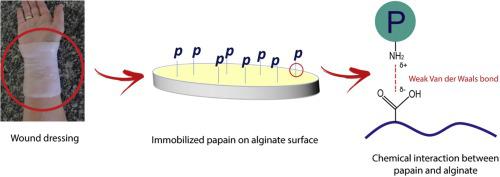Colloids and Surfaces B: Biointerfaces ( IF 5.4 ) Pub Date : 2020-06-25 , DOI: 10.1016/j.colsurfb.2020.111222 Raimundo Nonato Fernandes Moreira Filho 1 , Niédja Fittipaldi Vasconcelos 2 , Fabia Karine Andrade 3 , Morsyleide de Freitas Rosa 4 , Rodrigo Silveira Vieira 5

|
Wound dressings based on natural polymers are of considerable interest in the pharmaceutical industry owing to their improved performance in the human body when compared to synthetic polymers. Alginate, a polysaccharide from brown algae, is commonly studied as a wound dressing owing to its biocompatibility and biodegradability. To improve its therapeutic features and thereby increase wound healing, papain (a proteolytic enzyme from Carica papaya latex) was proposed to be incorporated. Papain is capable of promoting the debridement of devitalized or necrotic tissues. The development of dressing based on alginate and papain aggregates the healing properties of both materials. In addition, the adsorption on a support can stabilize the enzyme structure and permits its release in a controlled manner. The optimal conditions for immobilization were evaluated (initial concentration, temperature, and pH), and the amount immobilized was measured by Bradford assay. The enzyme activity stability over 28 days was measured. The release profile was determined using Franz cell. In vitro cytotoxicity assays were performed using fibroblasts and keratinocytes. Optimal immobilization conditions were identified in a neutral medium at a papain concentration of 20 mg/mL and temperature of 25 °C. The enzyme remained active after immobilization (80 % of its initial activity), and the matrix protected the enzyme from deactivation (70 % reduction on the matrix compared to 94 % in a buffer solution). Franz cell displayed a release profile of 64.1 % of the enzyme after 24 h. The biological assays indicated a bioactive material with proteolytic properties.
中文翻译:

木瓜蛋白酶固定在藻酸盐膜上用于伤口敷料。
与合成聚合物相比,基于天然聚合物的伤口敷料因其在人体中的性能得到改善而在制药工业中引起了相当大的兴趣。海藻酸盐是一种来自褐藻的多糖,由于其生物相容性和生物降解性,通常被用作伤口敷料。为了改善其治疗功能并因此促进伤口愈合,木瓜蛋白酶(一种来自番木瓜的蛋白水解酶乳胶)被提议纳入。木瓜蛋白酶能够促进失活或坏死组织的清创。基于藻酸盐和木瓜蛋白酶的敷料的开发综合了这两种材料的愈合特性。此外,载体上的吸附可以稳定酶结构并允许其以受控方式释放。评估了固定的最佳条件(初始浓度、温度和 pH),并通过 Bradford 测定法测量了固定量。测量了超过 28 天的酶活性稳定性。使用弗朗兹池确定释放曲线。体外使用成纤维细胞和角质形成细胞进行细胞毒性测定。在木瓜蛋白酶浓度为 20 mg/mL 和温度为 25 °C 的中性介质中确定了最佳固定条件。酶在固定后保持活性(其初始活性的 80%),并且基质保护酶免于失活(基质上减少 70%,而缓冲溶液中减少 94%)。Franz 细胞在 24 小时后显示出 64.1% 的酶释放曲线。生物测定表明具有蛋白水解特性的生物活性材料。









































 京公网安备 11010802027423号
京公网安备 11010802027423号